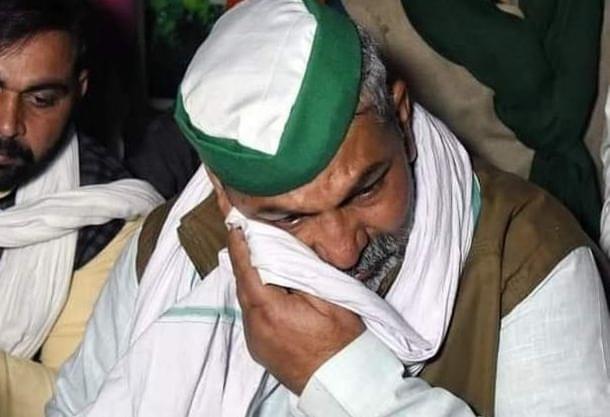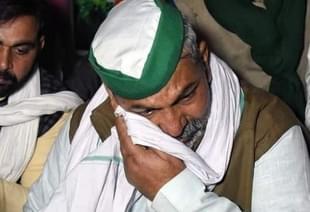News Brief
A Failed Politician With A New 'Dream': How Rakesh Tikait Was Propped Up As Farmer Protest Leader And What It Means
Swarajya Staff
Feb 04, 2021, 02:33 PM | Updated 02:33 PM IST
Save & read from anywhere!
Bookmark stories for easy access on any device or the Swarajya app.


Rakesh Tikait is making headlines after an emotional speech on Thursday evening at Ghazipur. He broke down and said that he would hang himself if the farm laws weren’t repealed. The video clip went viral.
“Har kisan roya aur sabhi ko Mahender Singh Ji yaad aaya (every farmer cried and remembered his father and BKU founder Mahendra Singh Tikait)”, Rajvir Singh Mundet, a Shamli-based social worker and activist, was quoted as saying by Indian Express.
Rakesh is the younger son of legendary farmer leader and Bharatiya Kisan Union (BKU) co-founder late Mahendra Singh Tikait.
“That single emotional act – everyone saw his humiliation by a vindictive government as their own – has united our entire farming community not only in West UP, but also Haryana, Punjab, Rajasthan and Delhi. This has never happened since 1987-88,” Mundet added.
Mundet is referring to Mahendra Singh Tikait organising a four-day dharna at the Karmukhera Power House in Muzaffarnagar in January 1987 against the state government’s hiking electricity tariffs by a third.
A 24-day gherao of the Meerut Commissionerate for increasing the official sugarcane price from Rs 27 to Rs 35/quintal was organised by him a year later, and, finally, a week-long rally of half-a-million farmers at New Delhi’s Boat Club lawns in October 1988.
While Rakesh is the national spokesperson for the BKU, his older brother Naresh Tikait is the National President.
Seen as somewhat mild in comparison to the Punjab-Haryana counterparts, Rakesh Tikait adopted a bold move in the course of ongoing farmers’ protests by refusing to follow the local administration’s orders to vacate the site and court arrest.
When Tikait was asked by the media, why he was crying, he said through tears that the local MLA and others attempted to beat up their old colleagues who are agitating here.
“The police had promised us safe passage and now they are doing this. So I will continue with the dharna,” he said.
Sudhir Bisht in a reddif.com article says that there was no beating up of anyone on the Ghazipur protest side. However, Tikait’s tears were real.
According to Bisht, Rakesh Tikait is a son who is trying to live up to his father's legacy, but faltering repeatedly.
“His father Mahendra Singh Tikait was a leader sans much political ambition. Tikait Sr was the undisputed king of hearts of all people in the sugarcane belt of western Uttar Pradesh..Tikait Sr was the true inheritor of Chaudhary Charan Singh's legacy,” he writes.
“He controlled 70 MLAs in the Uttar Pradesh assembly and had some influence over at least 50 more MLAs. He could rattle the state government while he smoked a hookah in his village chaupal..Mahendra Singh Tikait had a glorious run in the kisan movement, but his son has been a failure in comparison,” writes Bisht.
In 2007, Rakesh Tikait contested the Uttar Pradesh assembly election from with active support from Sonia Gandhi's Congress, and finished sixth. Notably, this was his hometown Khatauli in western UP that rejected him.
In 2014, he fought the Lok Sabha election from Amroha in western UP on a Rashtriya Lok Dal ticket. The defeat was humiliating and he lost his security deposit, bagging just 9,539 votes.
Even in the current protests at the Delhi-UP Ghazipur border protest site, the farmers from Tikait’s BKU were, reportedly, till quite recently, numerically less than those mobilised by V M Singh's Rashtriya Kisan Mazdoor Sangathan.
In fact, Tikait was a forgotten man when the current protests were launched. It is also notable that Tikait had, at first, supported the the three farm laws.
What, then, happened that he changed his mind and became a front leader of the anti- farm laws protests? No media channel has asked Tikait this question.
Bisht has a theory. He says that the Punjab farmers who take away the largest share of MSP in India were looking for a non-Sikh ally to give their anti-farm laws agitation a secular outlook, and zeroed in on Rakesh Tikait -- a failed kisan leader eager to resurrect his career.
“As soon as Rakesh Tikait received strong feelers from the rich, large-hectare owning, Sikh farmers in Punjab to join hands with them, he agreed.. Rakesh Tikait was soon all over the news television channels. In a clever media strategy crafted by the Punjab farmers, Tikait was given centre-stage so that the agitation did not give an impression of being a Punjab centric one,” writes Bisht.
Tikait became the face of the agitation just as Yogendra Yadav became its brain, says Bisht. It was a part of the strategy to maintain a broad outlook while the invisible hands did their work.
According to Bisht, Tikait cried because after 26 January farmer tractor rally violence, his last attempt at image resurrection had but failed.
“The UP government issued Tikait a notice to vacate the Ghazipur border under Section 133 of the Criminal Procedure Code and the Delhi government lodged an FIR against him.. Rakesh Tikait feared arrest and imminent downfall.. He became the high school boy who had failed in the examination for the third time, and so he cried,” writes Bisht.
However, the tears did the magic for Tikait. His humiliation was seen as their own by the whole Jat community. “He may be a failed son, but a son nevertheless,” says Bisht.
The community leaders have now put their might behind Tikait and asked him to stay put at the Ghazipur border. The pressure from Punjab leaders and the connected groups of international character is also high.
After rival V M Singh’s departure, Tikait has become western UP’s undisputed farmer leader.
Reportedly, Rashtriya Lok Dal chief Chaudhary Ajit Singh personally called him up the same night as the speech and professed support. Support is also coming in from Jat leaders of neighbouring states, including Indian National Lok Dal’s Abhay Singh Chautala and Rashtriya Loktantrik Party’s Hanuman Beniwal.
It is clear now that the farmers’ protests are not as much about the three farm laws as other things. The reason Tikait’s tears worked is because they give expression to the general fears of the farmers of India, and the uncertainty of moving from the past to the future.
In a 5-trillion dollar knowledge economy that India aspired to be, where does the Indian farmer stand?
No large country in the world, to this day, has managed to grow and end poverty without moving the workforce and investment away from the agriculture sector to others. This is the transition that India hopes to make too, but how?
In India, the discourse of development and government policy is far too ideologically poisoned to work out the give and take, balance and correction that is required for effective policy making. One economist suggested that India can only carry out reforms “by stealth”, using the crutches of a crisis.
The farmers in western Uttar Pradesh are angered by low sugarcane prices announced by the administration, the doubling of electricity charges for both irrigation pumps and domestic connections, and diesel turning costlier. Tikait’s tears give expression to this anger.
Also, unlike the popular Bollywood image, India’s farmers are not a marginalised lot. The ‘Bullock capitalists’, as they are called, are politically powerful. The protests today are also, therefore, markedly different from the past.
Journalist Harvir Singh says : “The seventies and eighties were a period of relative prosperity for farmers, with improved crop yields from newly bred wheat and sugarcane varieties. There were government jobs – whether in the Army and police or as schoolteachers and village level workers – even for those with basic education, which itself was cheap. The BKU’s agitations then were only to defend those gains."
The ongoing protests, by contrast, are by farmers who, having seen better times, are scared of sliding down in the future.
That the newspaper columns that criticise India’s farming sector all year round for guzzling groundwater with cheap electricity, destroying ecosystems by using chemical fertilizers and pesticides, farm loan waivers etc. are suddenly arguing for preserving it carefully as a museum against reforms - only adds to the confusion.
The hope, then, lies in realpolitik and some sort of a political compromise, which, in turn, depends on the level headedness of the leaders on both sides.
However, the hope is this regard isn’t high because Tikait is weak, and vested interests with no direct link to Indian farmers’ issues have inserted themselves deeply in the protests.
History stands as a witness that foreign involvement in domestic protests always harms the cause. Farmer consolidation around Tikait, in that sense, will be a good news if it gives him the confidence to make farmers’ movement autonomous.
Herein lies the dilemma of the ‘invisible hands’.
Too weak a Tikait is useless, but a Tikait too powerful will be a liability, which is why, parallel to his insurrection, the narrative of him being a “BJP stooge” has been carefully kept alive, in case Tikait tries to come to an acceptable agreement with the government to secure farmers’ interests.





